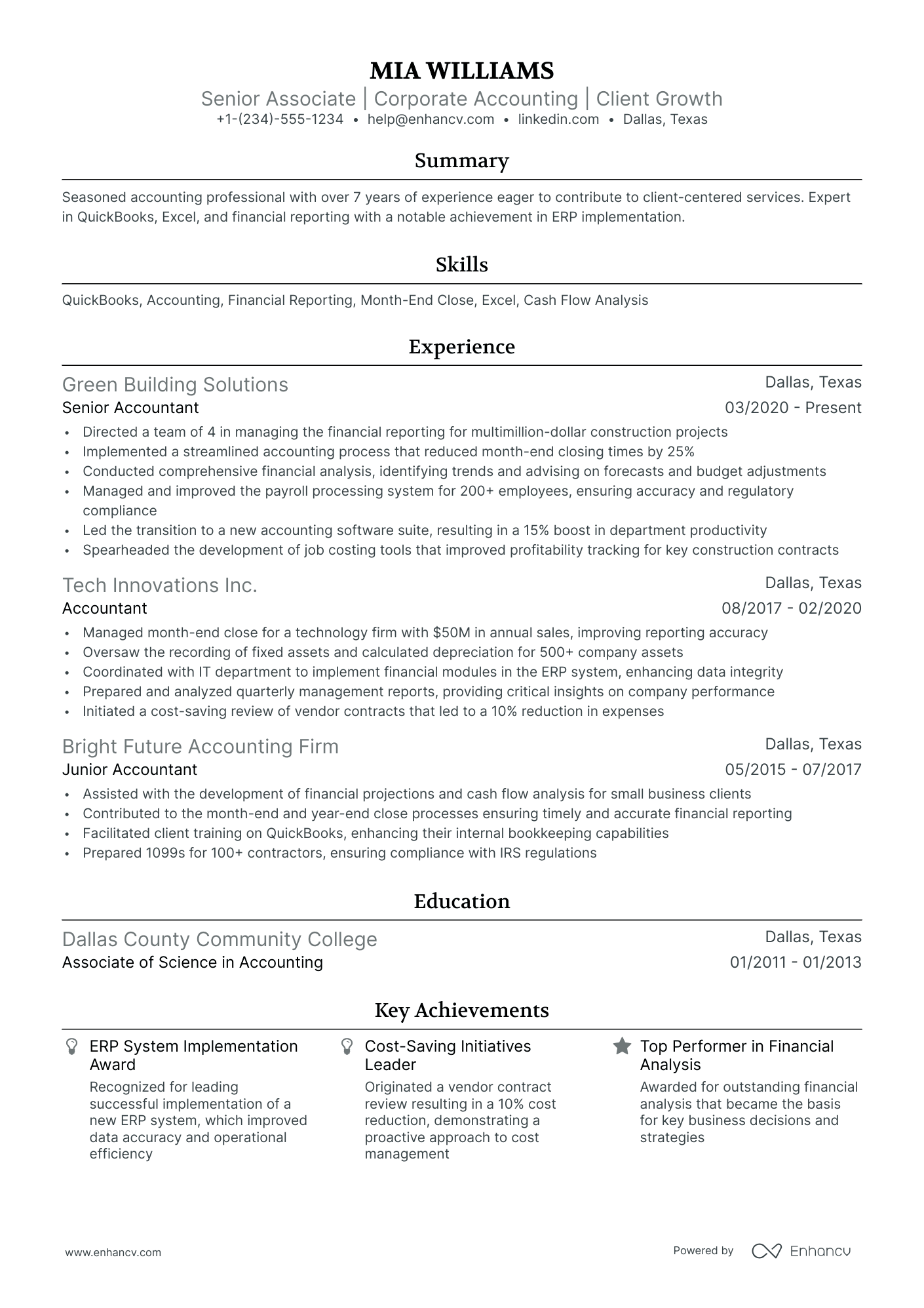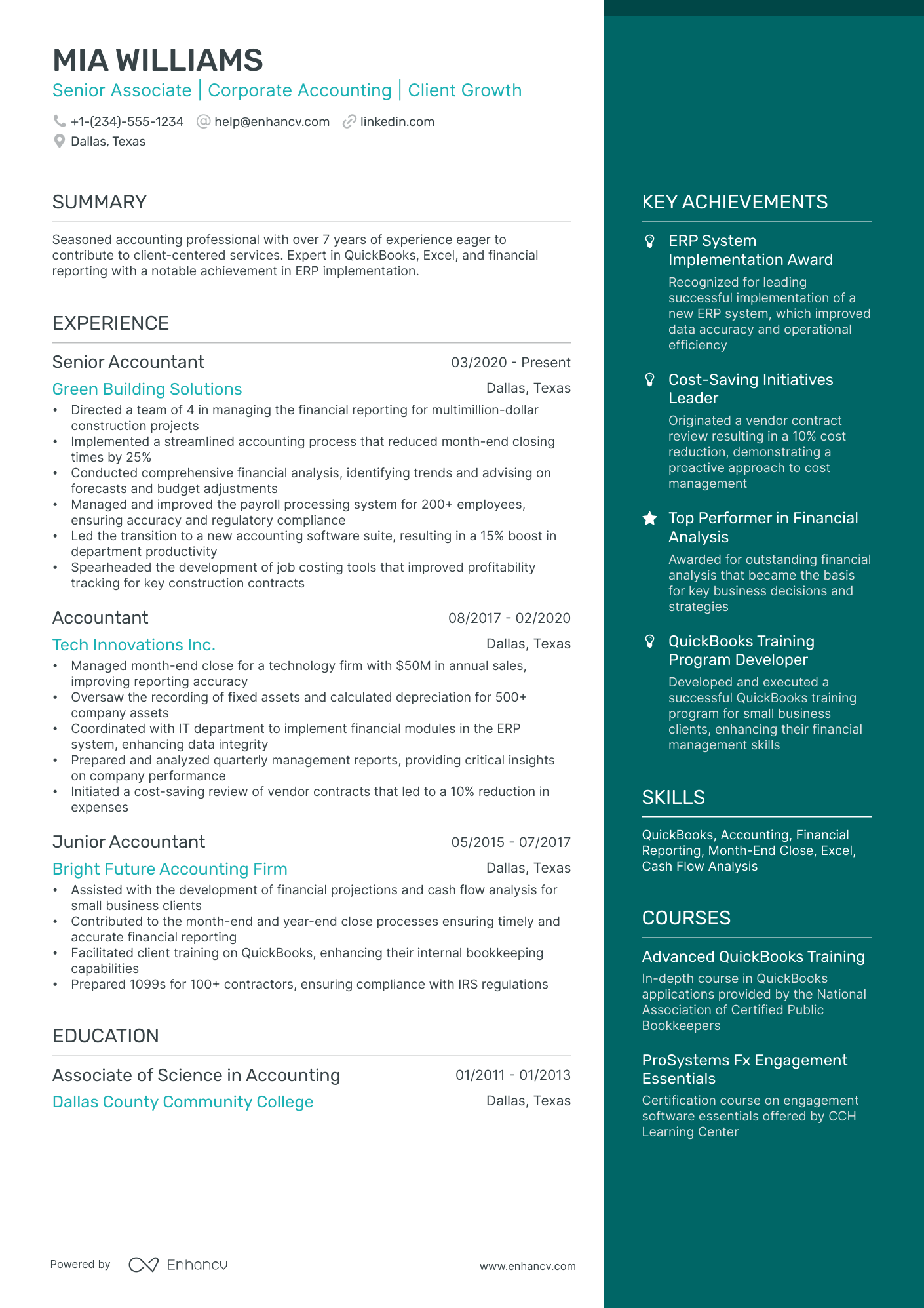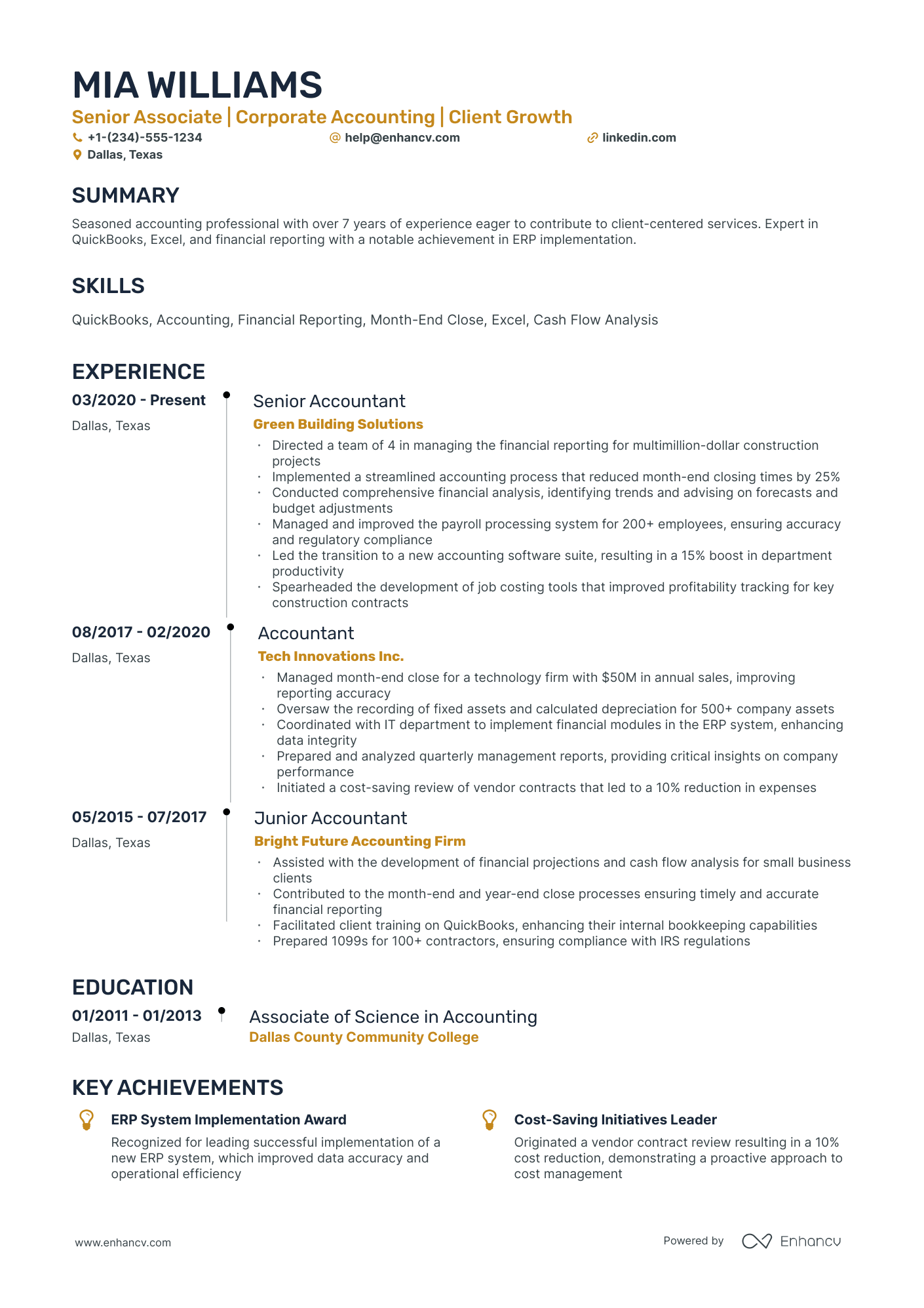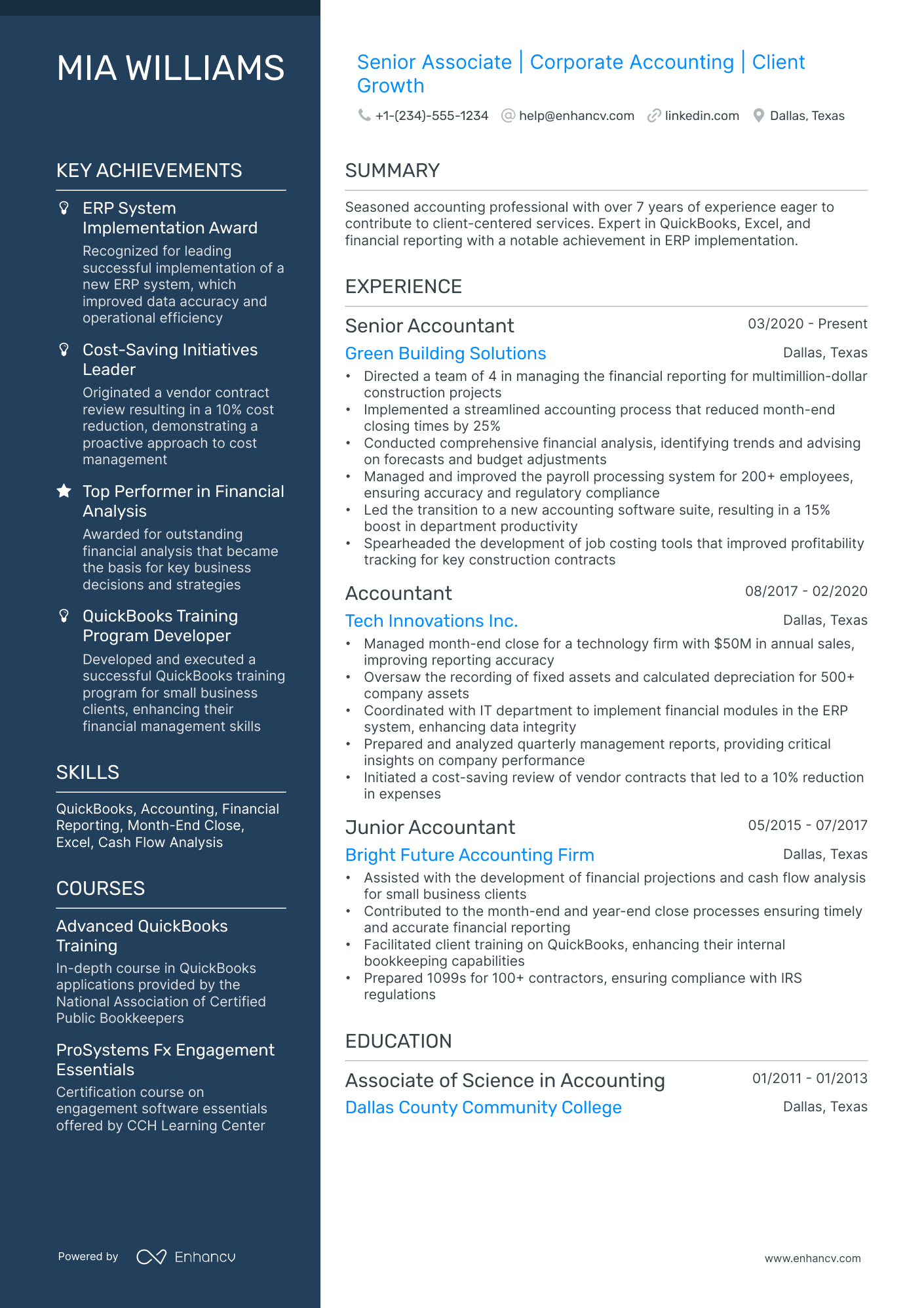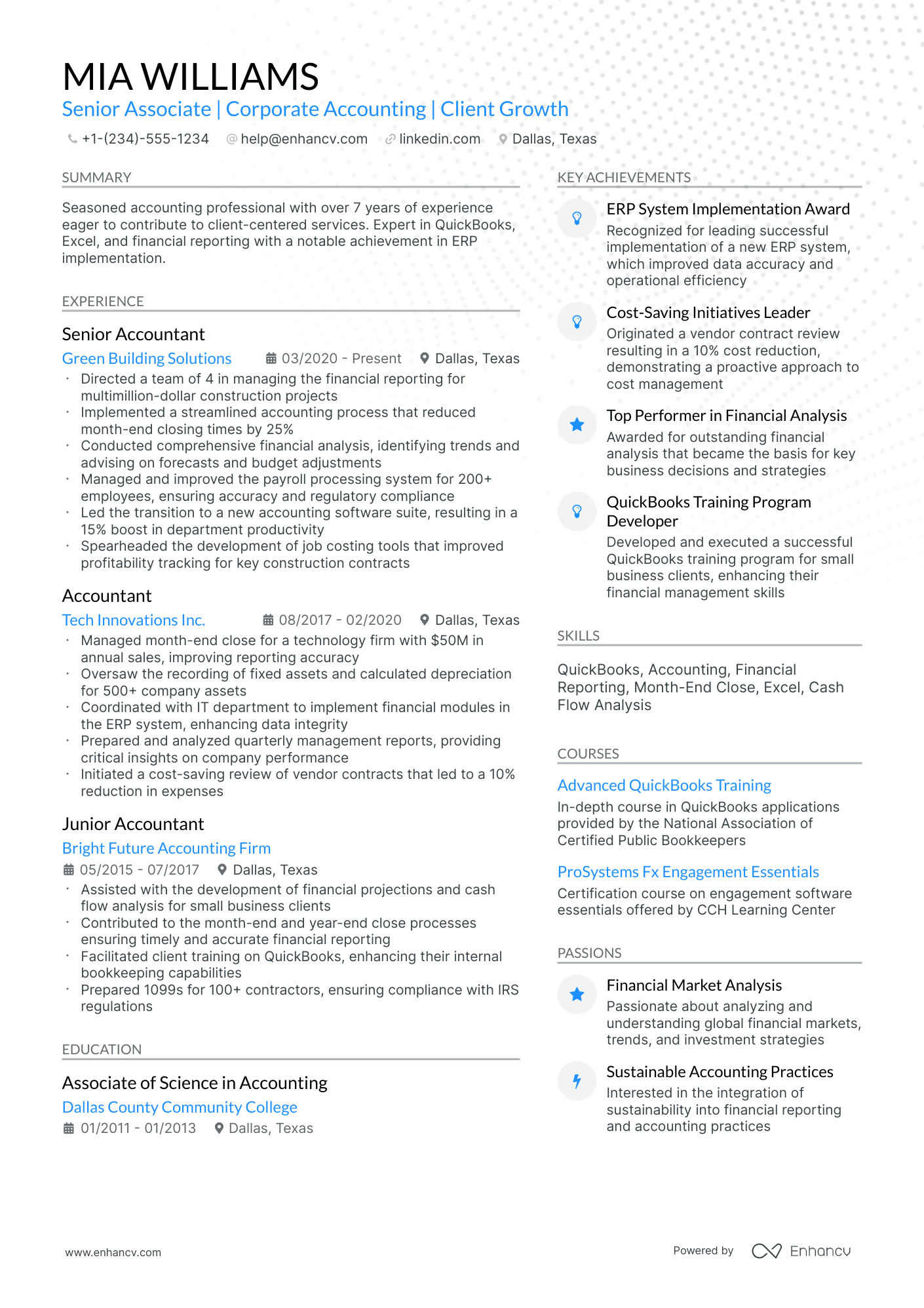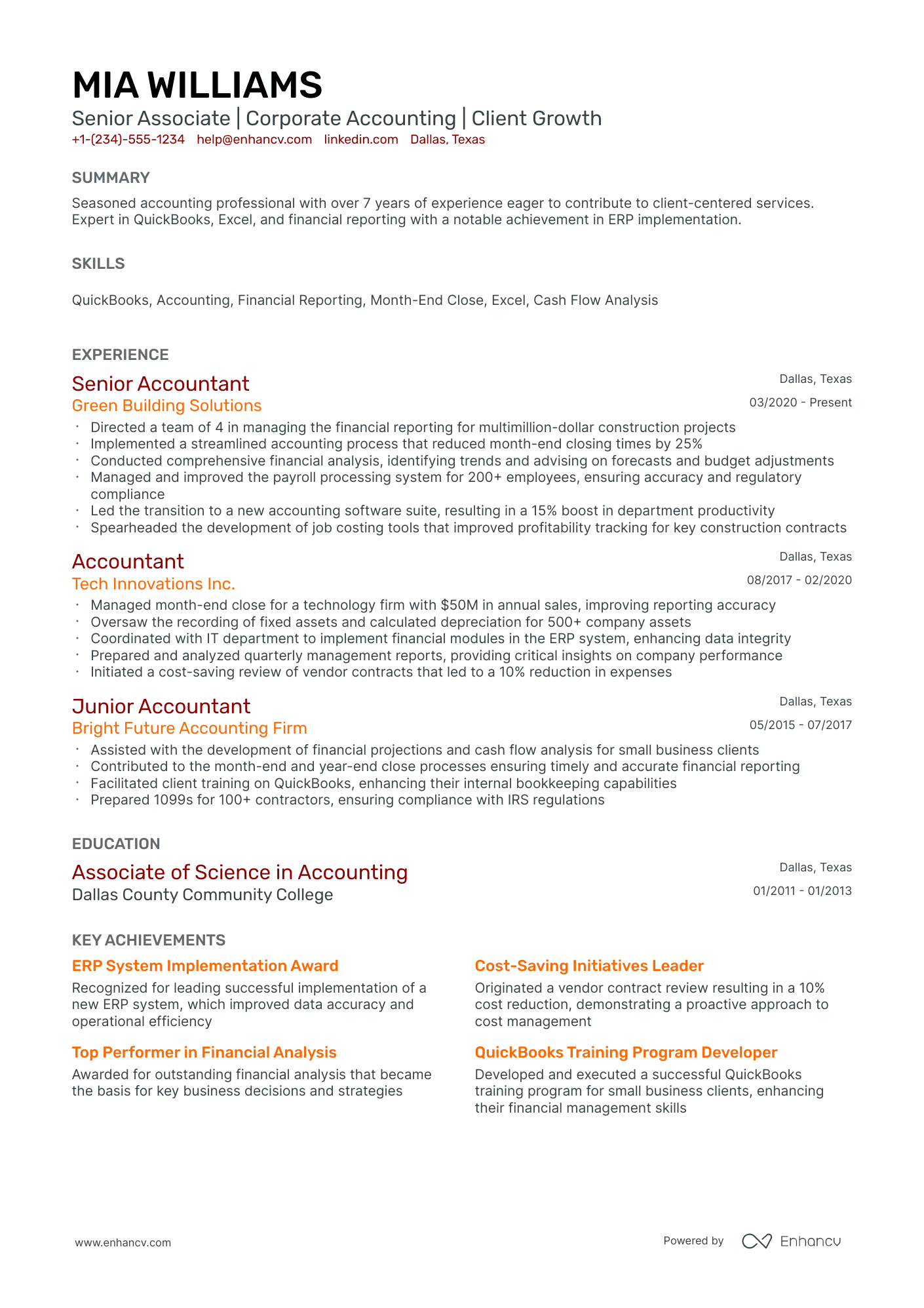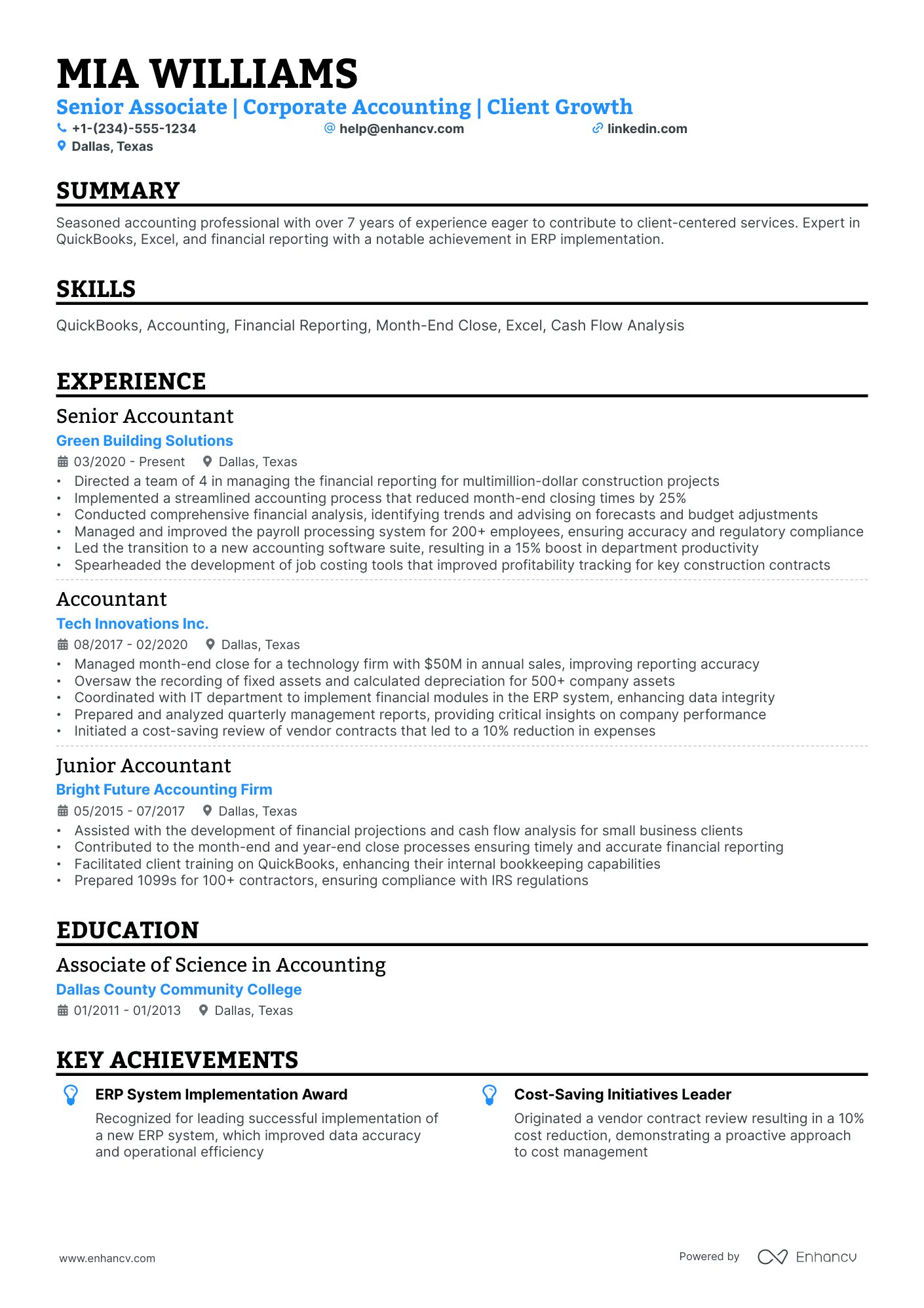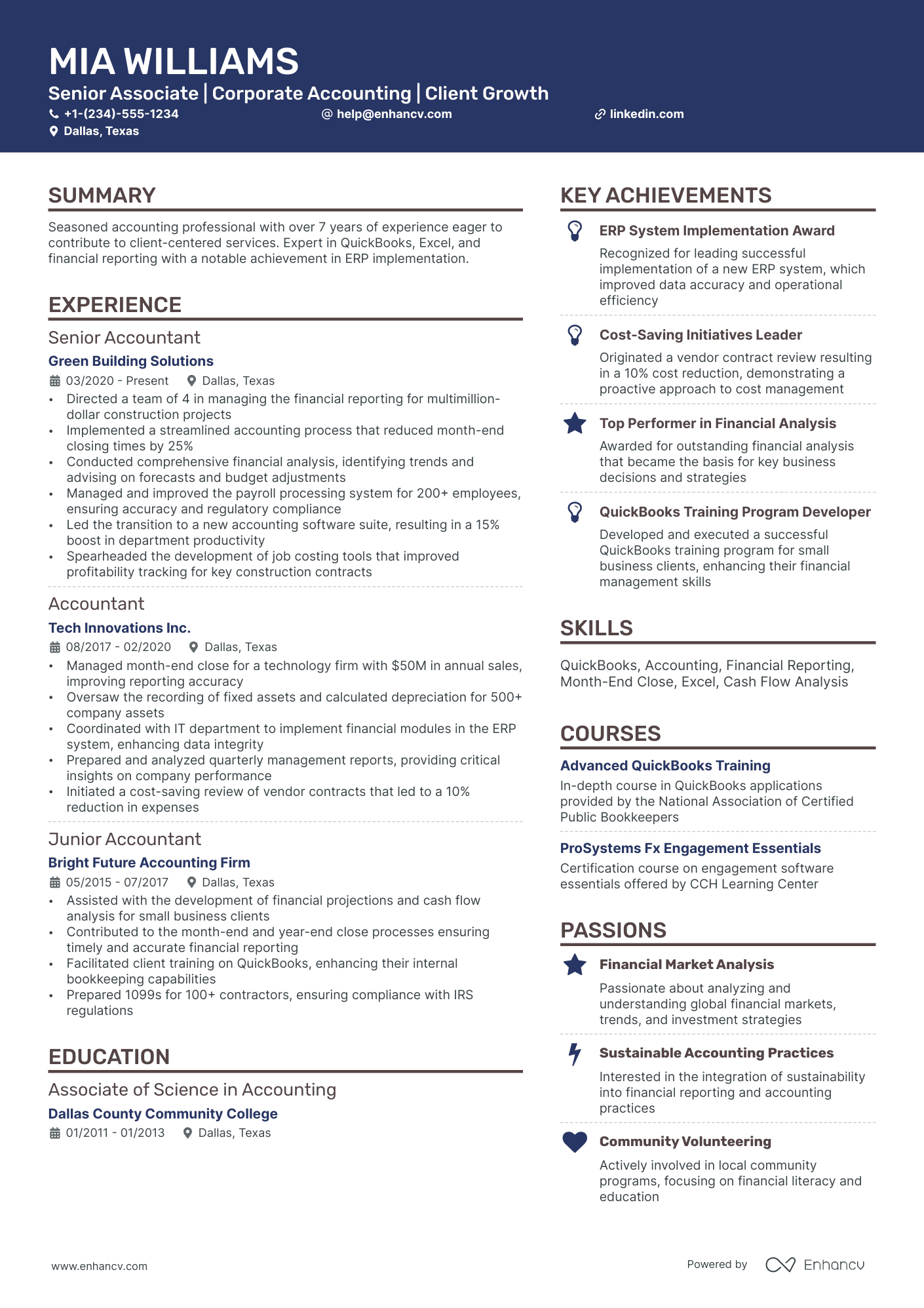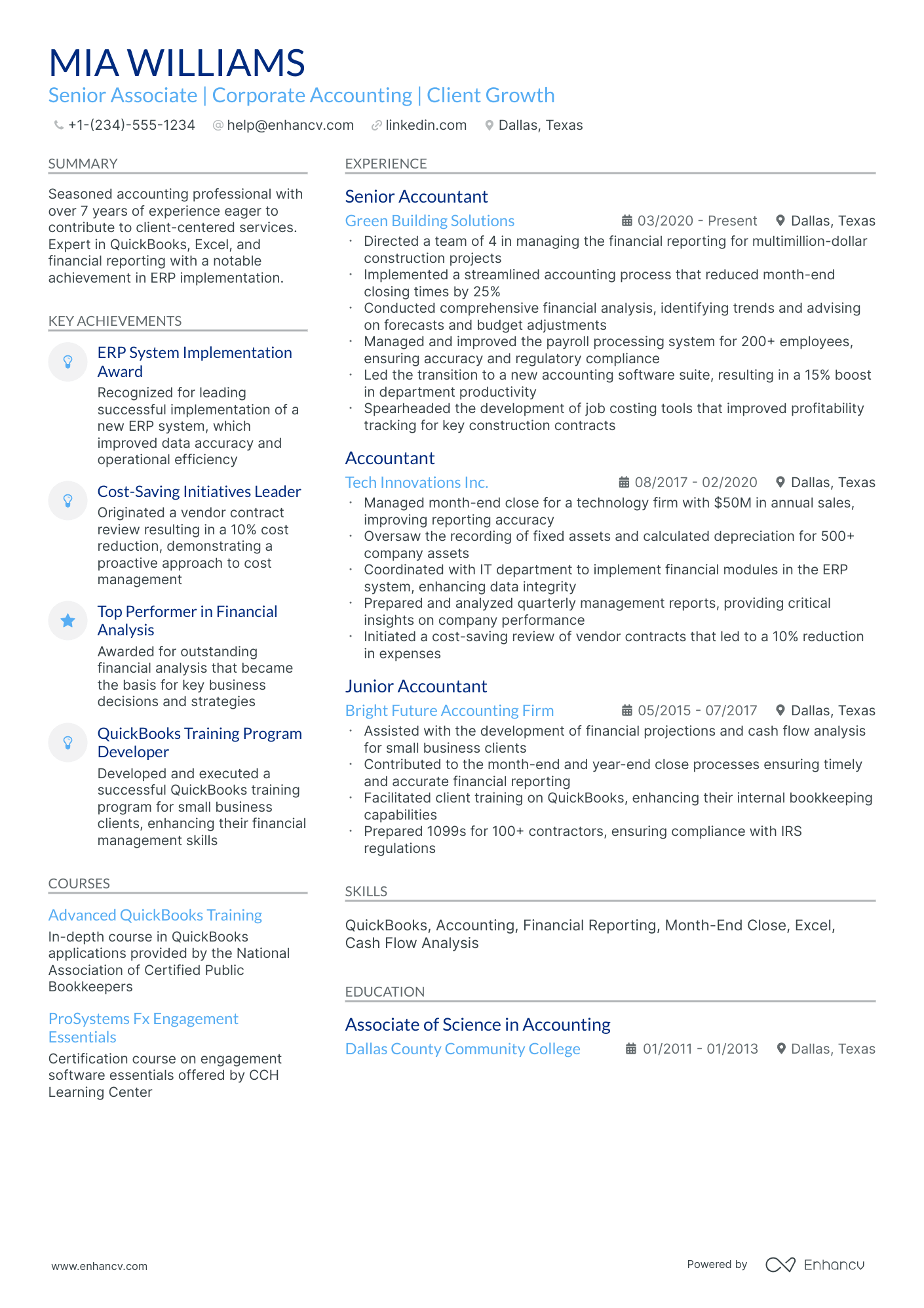Corporate accountant resume guides often fail because they read like task logs, not decision-ready summaries. That buries impact during ATS screening and quick recruiter scans. With tighter competition and faster hiring cycles, vague bullets stop interviews before they start.
A strong resume shows what changed because of your work and how well you delivered. Understanding how to write a resume that highlights close accuracy, cycle-time reductions, audit outcomes, materiality and scope, and cash or margin impact is essential. Quantify reconciliations, entities supported, controls strengthened, and reporting timeliness.
Key takeaways
- Quantify every experience bullet with metrics like close-cycle days, error rates, or dollars saved.
- Use reverse-chronological format to showcase progressive corporate accounting responsibility and scope.
- Tailor resume language to mirror each job posting's specific tools, standards, and priorities.
- Anchor skills in real achievements within your summary and experience sections, not just lists.
- Lead entry-level resumes with projects, certifications, and reconciliation work that prove technical readiness.
- Place CPA or CMA certifications prominently—they carry significant weight in corporate accounting hiring.
- Use Enhancv to turn routine accounting tasks into measurable, recruiter-ready resume bullets faster.
Job market snapshot for corporate accountings
We analyzed 340 recent corporate accounting job ads across major US job boards. These numbers help you understand regional hotspots, career growth patterns, employer expectations at a glance.
What level of experience employers are looking for corporate accountings
| Years of Experience | Percentage found in job ads |
|---|---|
| 1–2 years | 7.9% (27) |
| 3–4 years | 5.3% (18) |
| 5–6 years | 20.9% (71) |
| 7–8 years | 4.7% (16) |
| 9–10 years | 2.4% (8) |
| 10+ years | 3.8% (13) |
| Not specified | 57.4% (195) |
Corporate accounting ads by area of specialization (industry)
| Industry (Area) | Percentage found in job ads |
|---|---|
| Finance & Banking | 76.5% (260) |
| Healthcare | 17.4% (59) |
Top companies hiring corporate accountings
| Company | Percentage found in job ads |
|---|---|
| Ecolab Inc. | 12.4% (42) |
| Akumin Inc. | 6.2% (21) |
| CrowdStrike | 3.2% (11) |
| GSK, Plc. | 2.9% (10) |
Role overview stats
These tables show the most common responsibilities and employment types for corporate accounting roles. Use them to align your resume with what employers expect and to understand how the role is structured across the market.
Day-to-day activities and top responsibilities for a corporate accounting
| Responsibility | Percentage found in job ads |
|---|---|
| Accounting | 27.1% (92) |
| Excel | 22.9% (78) |
| Microsoft excel | 17.9% (61) |
| Financial reporting | 16.8% (57) |
| Us gaap | 14.1% (48) |
| Gaap | 13.5% (46) |
| Journal entries | 13.5% (46) |
| Crm | 11.8% (40) |
| Account reconciliations | 10.6% (36) |
| Powerpoint | 8.8% (30) |
| Pivot tables | 8.5% (29) |
| Financial statements | 8.2% (28) |
Type of employment (remote vs on-site vs hybrid)
| Employment type | Percentage found in job ads |
|---|---|
| On-site | 51.2% (174) |
| Remote | 27.6% (94) |
| Hybrid | 21.2% (72) |
How to format a corporate accounting resume
Recruiters evaluating corporate accounting resumes prioritize accuracy in financial reporting, regulatory compliance expertise, and a demonstrated history of managing close cycles, audits, and internal controls. A clean reverse-chronological format ensures these signals surface immediately, letting hiring managers trace your progression through increasingly complex accounting responsibilities without friction.
I have significant experience in this role—which format should I use?
Use a reverse-chronological format—it's the strongest choice for experienced corporate accountants because it foregrounds your trajectory through expanding financial ownership and compliance scope. Do:
- Lead with your most recent role and clearly define the scope of each position: entity count, team size, reporting lines, and budget or asset values under your oversight.
- Highlight domain-specific proficiency in tools and frameworks relevant to corporate accounting—ERP systems (SAP, Oracle, NetSuite), GAAP/IFRS standards, SOX compliance, and consolidation platforms.
- Quantify outcomes tied to efficiency, accuracy, or cost impact rather than listing routine duties.
Why hybrid and functional resumes don't work for senior roles
Hybrid and functional formats fragment your career timeline, making it difficult for recruiters to assess how your leadership scope, decision-making authority, and accountability evolved across roles—signals that are critical for senior corporate accounting positions. By grouping skills apart from the roles where you applied them, these formats dilute the impact of achievements like managing multi-entity consolidations, leading audit responses, or building accounting teams from the ground up. Avoid hybrid and functional formats entirely if you have five or more years of progressive corporate accounting experience, as they'll raise more questions about your background than they answer. Choosing the right resume layout ensures your progression and impact remain front and center.
- Edge-case exception: A functional format may be acceptable only if you're transitioning into corporate accounting from a closely related field (such as public accounting or internal audit) with a significant employment gap—but even then, every listed skill must be anchored to a specific project, engagement, or measurable outcome rather than presented in isolation.
Once your layout and formatting choices are in place, the next step is deciding which sections to include so each one reinforces your qualifications.
What sections should go on a corporate accounting resume
Recruiters expect you to present a clean, standard resume layout that highlights corporate accounting scope, accuracy, and business impact. Knowing what to put on a resume ensures every section earns its place.
Use this structure for maximum clarity:
- Header
- Summary
- Experience
- Skills
- Projects
- Education
- Certifications
- Optional sections: Awards, Leadership, Languages
Strong experience bullets should emphasize measurable impact, audit-ready accuracy, reporting scope, close timelines, and results tied to financial statements and business decisions.
Is your resume good enough?
Drop your resume here or choose a file. PDF & DOCX only. Max 2MB file size.
Once you’ve organized the key resume components, focus next on writing your corporate accounting experience section so each role clearly supports those elements.
How to write your corporate accounting resume experience
The experience section of your corporate accounting resume should spotlight work you've delivered—reconciliations closed, audits completed, reporting cycles improved—using the tools, standards, and methods that define the role. Hiring managers prioritize demonstrated impact over descriptive task lists, so every bullet should connect what you did to a measurable outcome that mattered to the business.
Each entry should include:
- Job title
- Company and location (or remote)
- Dates of employment (month and year)
Three to five concise bullet points showing what you owned, how you executed, and what outcomes you delivered:
- Ownership scope: the accounts, ledgers, reporting entities, legal structures, or financial processes you were directly accountable for within the corporate accounting function.
- Execution approach: the ERP systems, accounting standards (GAAP or IFRS), reconciliation platforms, consolidation tools, or internal control frameworks you applied to complete your work accurately and on time.
- Value improved: changes to close-cycle speed, reporting accuracy, audit readiness, compliance posture, or operational efficiency that resulted from your contributions to the accounting organization.
- Collaboration context: how you partnered with FP&A, tax, treasury, external auditors, or business unit leaders to align financial reporting with broader organizational objectives.
- Impact delivered: outcomes framed as tangible results—reductions in variance, faster period-end closes, stronger internal controls, or improved financial transparency—rather than routine activity descriptions.
Experience bullet formula
A corporate accounting experience example
✅ Right example - modern, quantified, specific.
Senior Corporate Accountant
Northbridge Consumer Goods | Chicago, IL
2021–Present
Publicly traded consumer products manufacturer with $1.2B revenue and multi-entity operations across the US and Canada.
- Led month-end close for eight legal entities in Oracle NetSuite and BlackLine, cutting close from eight to five business days by automating reconciliations and standard journal entry workflows.
- Prepared and reviewed revenue and accrual entries under ASC 606 and ASC 450, reducing post-close audit adjustments by 35% through tighter cutoff testing and variance analysis in Excel Power Query.
- Partnered with FP&A and business unit leaders to redesign operating expense allocations, improving forecast accuracy by 4% and eliminating $1.1M in misclassified spend using standardized cost center mapping.
- Built SOX-ready controls and documentation for account reconciliations and journal approvals, lowering control exceptions by 60% and improving audit PBC turnaround by 30% in Workiva.
- Coordinated with tax and external auditors during quarterly reviews and year-end audit, resolving complex intercompany and consolidation issues in OneStream and reducing audit fieldwork days by three.
Now that you've seen how a strong experience section comes together, let's look at how to adjust yours to match a specific job posting.
How to tailor your corporate accounting resume experience
Recruiters evaluate your corporate accounting resume through applicant tracking systems and manual review, scoring candidates on how closely their experience matches the posting. Tailoring your resume to the job description by reflecting the posting's specific language and priorities increases your chances of passing both screenings.
Ways to tailor your corporate accounting experience:
- Mirror the exact ERP software and financial tools listed in the posting.
- Match the job description's terminology for close processes and reporting cycles.
- Reflect specific GAAP or IFRS standards referenced in the requirements.
- Quantify results using the same KPIs the employer highlights as priorities.
- Include industry-specific experience that aligns with the company's sector.
- Emphasize SOX compliance or internal controls work when the role requires it.
- Highlight cross-functional collaboration with audit or FP&A teams if mentioned.
- Reference reconciliation workflows or journal entry volumes relevant to the role.
Tailoring means aligning your real accomplishments with each job's stated requirements, not forcing disconnected keywords into your experience section.
Resume tailoring examples for corporate accounting
| Job description excerpt | Untailored | Tailored |
|---|---|---|
| Prepare monthly, quarterly, and annual consolidated financial statements in compliance with US GAAP; coordinate with external auditors during year-end audit. | Helped with financial reports and assisted during audits. | Prepared consolidated financial statements (monthly, quarterly, annual) under US GAAP for a $180M entity and served as primary liaison to Deloitte during year-end audit, reducing audit completion time by 12 days. |
| Perform account reconciliations across 15+ general ledger accounts, investigate variances, and ensure timely month-end close within a five-business-day cycle. | Responsible for reconciling accounts and closing the books each month. | Reconciled 18 general ledger accounts each period, investigated and resolved variances exceeding $5K, and consistently completed month-end close within the five-business-day target for 24 consecutive months. |
| Support the transition from legacy ERP to Oracle Cloud Financials, including data migration, UAT testing, and documentation of new accounting workflows. | Participated in a system upgrade project and helped with testing. | Partnered with IT and finance teams to migrate three years of transactional data from a legacy ERP to Oracle Cloud Financials, executed 120+ UAT test scripts, and documented revised workflows for accounts payable, fixed assets, and intercompany accounting. |
Once you’ve aligned your experience with the role’s priorities, the next step is to quantify your corporate accounting achievements so hiring managers can see the impact behind your work.
How to quantify your corporate accounting achievements
Quantifying your achievements proves you improved close speed, accuracy, compliance, and cash outcomes. Focus on days to close, error rates, audit findings, dollars saved, reconciliations completed, and controls strengthened.
Quantifying examples for corporate accounting
| Metric | Example |
|---|---|
| Close cycle time | "Cut month-end close from eight to five business days by automating recurring journal entries in NetSuite and standardizing Flux Analysis templates." |
| Reconciliation volume | "Completed 220 balance sheet reconciliations per quarter across twelve entities, clearing ninety-five percent of aged items within thirty days." |
| Audit compliance | "Reduced external audit PBC requests by thirty percent and delivered zero late items by building an audit tracker in Excel and enforcing weekly owner check-ins." |
| Error rate | "Lowered journal entry rework from 6.5% to 1.8% by adding approval workflows in Workday and implementing a three-point variance review checklist." |
| Cost savings | "Saved $180,000 annually by renegotiating fixed-asset tagging and disposal services and tightening capitalization thresholds across three business units." |
Turn your everyday tasks into measurable, recruiter-ready resume bullets in seconds with Enhancv's Bullet Point Generator.
Once you've crafted strong bullet points for your experience section, you'll want to apply that same precision to presenting your hard and soft skills on a corporate accounting resume.
How to list your hard and soft skills on a corporate accounting resume
Your skills section shows you can close the books accurately and on time, and recruiters and ATS scan it to confirm you match the role's requirements; aim for a mix weighted toward hard skills, supported by role-specific soft skills. corporate accounting roles require a blend of:
- Product strategy and discovery skills.
- Data, analytics, and experimentation skills.
- Delivery, execution, and go-to-market discipline.
- Soft skills.
Your skills section should be:
- Scannable (bullet-style grouping).
- Relevant to the job post.
- Backed by proof in experience bullets.
- Updated with current tools.
Place your skills section:
- Above experience if you're junior or switching careers.
- Below experience if you're mid/senior with strong achievements.
Hard skills
- Month-end close
- Journal entries, accruals
- Account reconciliations
- General ledger accounting
- Financial statement preparation
- Variance analysis
- Revenue recognition (ASC 606)
- Lease accounting (ASC 842)
- Fixed assets, depreciation
- SOX controls, audit support
- ERP systems: NetSuite, SAP, Oracle
- Excel: pivot tables, Power Query
Soft skills
- Own close deadlines
- Communicate close status
- Partner with FP&A
- Align with tax and audit
- Escalate risks early
- Improve close workflows
- Document policies and controls
- Translate variances to insights
- Challenge unsupported entries
- Manage competing priorities
- Maintain confidentiality standards
- Coordinate cross-team approvals
How to show your corporate accounting skills in context
Skills shouldn't live only in a bulleted list on your resume. Explore how other professionals present their resume skills in context for inspiration.
They should be demonstrated in:
- Your summary (high-level professional identity)
- Your experience (proof through outcomes)
Here's how that looks in practice.
Summary example
Senior corporate accountant with 10+ years in manufacturing, skilled in SAP, GAAP compliance, and multi-entity consolidations. Led a close-process redesign that cut month-end reporting time by 35%. Known for cross-functional collaboration and clear financial storytelling.
- Specifies senior-level experience clearly
- Names role-relevant tools and standards
- Includes a measurable process improvement
- Highlights communication as a soft skill
Experience example
Senior Corporate Accountant
Vertex Industrial Group | Charlotte, NC
June 2018–Present
- Streamlined the monthly consolidation process across 12 entities using SAP, reducing close time from 10 days to six.
- Partnered with FP&A and tax teams to reconcile intercompany balances, eliminating $2.1M in discrepancies annually.
- Designed automated variance analysis workflows in Excel and Power BI, improving reporting accuracy by 28%.
- Every bullet includes a measurable outcome.
- Skills surface naturally through real achievements.
Once you’ve framed your accounting abilities through specific coursework, projects, and measurable results, the next step is applying that approach to a corporate accounting resume when you have no experience.
How do I write a corporate accounting resume with no experience
Even without full-time experience, you can demonstrate readiness through projects and early accounting work. Our guide on building a resume without work experience covers this in detail. Consider highlighting:
- Accounting internship or externship
- Corporate accounting class capstone
- Month-end close simulation project
- Accounts payable invoice processing practicum
- General ledger reconciliation assignments
- QuickBooks Online certification projects
- Volunteer bookkeeping for nonprofit
Focus on:
- Reconciliations tied to accuracy metrics
- Month-end close steps and timelines
- General ledger entries and support
- Accounting software and Excel outputs
Resume format tip for entry-level corporate accounting
Use a combination resume format because it highlights accounting projects and technical skills while still showing education and relevant experience substitutes. Do:
- Lead with a "Projects" section.
- Add tools: Excel, QuickBooks Online.
- Quantify results: variances, cycle time.
- Mirror corporate accounting job keywords.
- Include reconciliations and journal entries.
- Completed month-end close simulation in Excel and QuickBooks Online, posted twenty journal entries, reconciled five accounts, and reduced unreconciled variance from $1,250 to $0.
Even without hands-on experience, your education section can demonstrate the foundational knowledge and relevant coursework that qualify you for a corporate accounting role.
How to list your education on a corporate accounting resume
Your education section helps hiring teams confirm you have the foundational knowledge corporate accounting demands. It validates your academic training in accounting principles, financial reporting, and regulatory compliance.
Include:
- Degree name
- Institution
- Location
- Graduation year
- Relevant coursework (for juniors or entry-level candidates)
- Honors & GPA (if 3.5 or higher)
Skip month and day details—list the graduation year only.
Here's a strong education entry tailored to corporate accounting:
Example education entry
Bachelor of Science in Accounting
University of Illinois at Urbana-Champaign, Champaign, IL
Graduated 2022
GPA: 3.7/4.0
- Relevant Coursework: Intermediate Financial Accounting, Corporate Tax Strategy, Cost Accounting, Auditing & Assurance Services
- Honors: Dean's List (six semesters), Beta Alpha Psi Honor Society
How to list your certifications on a corporate accounting resume
Certifications on your resume show your commitment to learning, confirm tool proficiency, and prove industry relevance in corporate accounting roles. They help hiring teams trust your technical foundation and readiness to support close, reporting, and controls work. Include:
- Certificate name
- Issuing organization
- Year
- Optional: credential ID or URL
- Place certifications below education when they're older, less relevant to corporate accounting, or you already have strong, recent accounting coursework.
- Place certifications above education when they're recent, highly relevant to corporate accounting, or required for roles you're targeting.
Best certifications for your corporate accounting resume
Certified Public Accountant (CPA) Certified Management Accountant (CMA) Chartered Global Management Accountant (CGMA) Certified Internal Auditor (CIA) Certified Information Systems Auditor (CISA) Chartered Financial Analyst (CFA)
Once your credentials are clearly positioned to validate your accounting expertise, you can write your corporate accounting resume summary to highlight that value upfront.
How to write your corporate accounting resume summary
Your resume summary is the first thing a recruiter reads. A strong one instantly signals you're qualified for a corporate accounting role.
Keep it to three to four lines, with:
- Your title and total years of corporate accounting experience.
- The domain or industry you've worked in, such as manufacturing, SaaS, or financial services.
- Core tools and skills like GAAP compliance, ERP systems, or financial consolidation.
- One or two quantified achievements that demonstrate real impact.
- Soft skills tied to outcomes, such as cross-functional collaboration that improved close timelines.
PRO TIP
At a junior level, prioritize specific tools, relevant coursework, and early contributions over broad claims. Highlight Excel proficiency, ERP familiarity, and any measurable wins from internships or first roles. Avoid vague phrases like "passionate team player" or "motivated self-starter." Recruiters want evidence, not enthusiasm.
Example summary for a corporate accounting
Detail-oriented corporate accountant with two years of experience supporting month-end close in manufacturing. Reduced reconciliation errors by 30% using SAP and advanced Excel. Skilled in GAAP compliance and cross-departmental reporting.
Optimize your resume summary and objective for ATS
Drop your resume here or choose a file.
PDF & DOCX only. Max 2MB file size.
Now that your summary effectively showcases your corporate accounting expertise, make sure the header above it presents your contact details correctly so recruiters can reach you.
What to include in a corporate accounting resume header
A resume header lists your key identification and contact details, which boosts visibility, supports credibility, and speeds recruiter screening for corporate accounting roles.
Essential resume header elements
- Full name
- Tailored job title and headline
- Location
- Phone number
- Professional email
- GitHub link
- Portfolio link
A LinkedIn link helps recruiters verify experience quickly and supports screening.
Don't include a photo on a corporate accounting resume unless the role is explicitly front-facing or appearance-dependent.
Keep the header compact, consistent with your application name, and easy to scan in one glance on desktop and mobile.
Example
Corporate accounting resume header
Jordan Taylor
Corporate accounting senior accountant | Financial reporting, month-end close, SOX controls
Chicago, IL
(312) 555-01XX
jordan.taylor@enhancv.com github.com/jordantaylor yourwebsite.com linkedin.com/in/jordantaylor
Once your top-of-page contact and role details are in place, you can strengthen the resume with additional sections that add relevant context and support your corporate accounting qualifications.
Additional sections for corporate accounting resumes
Extra resume sections help you stand out when your core qualifications match other candidates, giving hiring managers more reasons to choose you.
Consider adding these sections if they strengthen your corporate accounting candidacy:
- Certifications and licenses
- Professional affiliations
- Languages — listing language skills can be especially valuable if the role involves multi-entity or international reporting
- Continuing education and professional development
- Volunteer experience
- Publications and presentations
- Awards and honors
With your resume's additional sections reinforcing your qualifications, the next step is pairing it with a strong cover letter to maximize your application's impact.
Do corporate accounting resumes need a cover letter
Corporate accounting resumes don't always need a cover letter. It helps when roles are competitive or employers expect one. If you're unsure where to start, understanding what a cover letter is and when it adds value can clarify your approach. It can make a difference when your resume needs context, or when you want to show clear fit.
Use a cover letter to add details your corporate accounting resume can't show:
- Explain role or team fit: Connect your experience to the company's close process, reporting cadence, and cross-functional partners.
- Highlight one or two outcomes: Pick a project with measurable impact, like shortening close time or improving reconciliations and controls.
- Show business context: Reference the product, customers, revenue model, and key accounting areas you'll support.
- Address transitions or non-obvious experience: Clarify a career change, gaps, or industry shifts, and tie them to corporate accounting requirements.
Drop your resume here or choose a file.
PDF & DOCX only. Max 2MB file size.
Once you’ve decided whether to include a cover letter, you can use AI to improve your corporate accounting resume by strengthening the content and tailoring it to the role.
Using AI to improve your corporate accounting resume
AI can sharpen your resume's clarity, structure, and impact. It helps refine bullet points, align language with job descriptions, and highlight measurable results. But overuse can strip away authenticity. Once your content feels clear and role-aligned, step back. For practical ideas, check out these ChatGPT resume writing prompts tailored to improving specific resume sections.
Here are 10 practical prompts to strengthen specific sections of your corporate accounting resume:
- Strengthen your summary. "Rewrite my corporate accounting resume summary to highlight relevant financial expertise, leadership scope, and measurable outcomes in under four sentences."
- Quantify experience bullets. "Add specific metrics like dollar amounts, percentages, or volume figures to these corporate accounting experience bullets without changing their meaning."
- Align with job descriptions. "Compare my corporate accounting resume experience section to this job posting and suggest language adjustments that improve keyword alignment."
- Clarify technical skills. "Reorganize my corporate accounting skills section by grouping tools, software, and competencies into clear, scannable categories."
- Tighten action verbs. "Replace weak or repetitive verbs in my corporate accounting experience bullets with stronger, more precise action words."
- Improve project descriptions. "Rewrite this corporate accounting project description to emphasize scope, my specific role, and the financial outcome delivered."
- Refine certifications section. "Format my corporate accounting certifications section to clearly show credential names, issuing bodies, and completion dates."
- Tailor education details. "Suggest which coursework or honors from my education section are most relevant to a corporate accounting role."
- Remove redundant phrasing. "Identify and remove filler words or redundant phrases across my entire corporate accounting resume."
- Highlight compliance experience. "Rewrite these corporate accounting bullets to better emphasize regulatory compliance, audit readiness, and internal controls expertise."
Stop using AI once your resume sounds accurate, specific, and aligned with real experience. AI should never invent experience or inflate claims—if it didn't happen, it doesn't belong here.
Conclusion
A strong corporate accounting resume proves impact with measurable outcomes, highlights role-specific skills, and follows a clear structure that’s easy to scan. Use consistent formatting, focused sections, and precise wording to show how you improved accuracy, close speed, and compliance.
Hiring teams today want corporate accounting candidates who can deliver results and adapt to changing reporting needs. When your resume stays clear, specific, and metric-driven, it signals readiness for the current market and the next hiring cycle.
